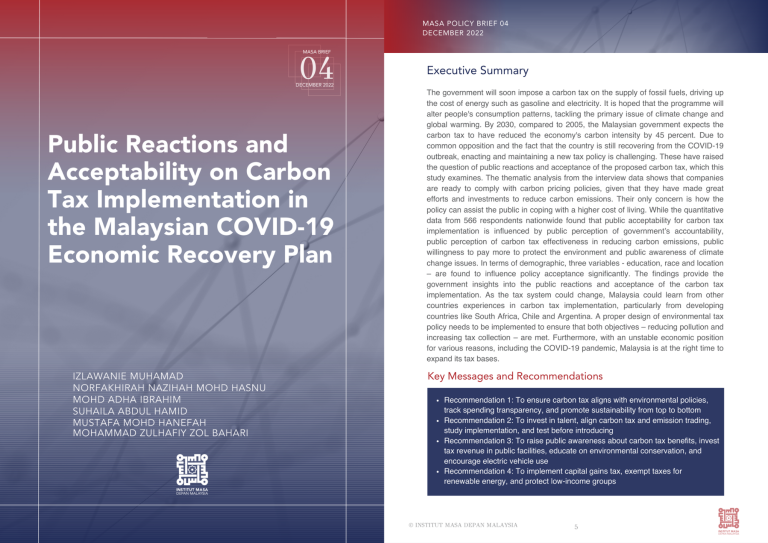The government will soon impose a carbon tax on the supply of fossil fuels, driving up the cost of energy such as gasoline and electricity. It is hoped that the programme will alter people’s consumption patterns, tackling the primary issue of climate change and global warming. By 2030, compared to 2005, the Malaysian government expects the carbon tax to have reduced the economy’s carbon intensity by 45 percent. Due to common opposition and the fact that the country is still recovering from the Covid-19 outbreak, enacting and maintaining a new tax policy is challenging. These have raised the question of public reactions and acceptance of the proposed carbon tax, which this study examines. The thematic analysis from the interview data shows that companies are ready to comply with carbon pricing policies, given that they have made great efforts and investments to reduce carbon emissions. Their only concern is how the policy can assist the public in coping with a higher cost of living. While the quantitative data from 566 respondents nationwide found that public acceptability for carbon tax implementation is influenced by public perception of government’s accountability, public perception of carbon tax effectiveness in reducing carbon emissions, public willingness to pay more to protect the environment and public awareness of climate change issues. In terms of demographic, three variables – education, race and location – are found to influence policy acceptance significantly. The findings provide the government insights into the public reactions and acceptance of the carbon tax implementation. As the tax system could change, Malaysia could learn from other countries experiences in carbon tax implementation, particularly from developing countries like South Africa, Chile and Argentina. A proper design of environmental tax policy needs to be implemented to ensure that both objectives – reducing pollution and increasing tax collection – are met. Furthermore, with an unstable economic position for various reasons, including the COVID-19 pandemic, Malaysia is at the right time to expand its tax bases.
#4 : Public Reactions and Acceptability on Carbon Tax Implementation in the Malaysian COVID-19 Economic Recovery Plan
- 23 Jun 2022
- Policy Brief, MASA Policy Development Programme
